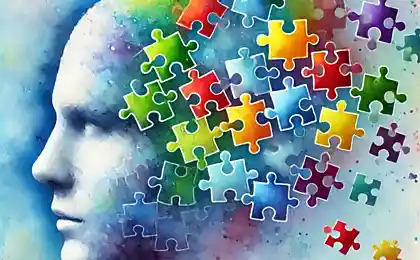83
3 super simple criteria to keep your mind healthy

What makes a person truly happy? This question has troubled the minds of philosophers, psychologists and ordinary people for thousands of years. Modern science gives us a surprisingly simple answer: there are only three fundamental criteria that determine the health of our minds. The best part is that each of us can do it!
A healthy mind is not the absence of problems, but the ability to solve them with a smile and confidence in the future.
A Revolutionary Discovery in Mental Health
Studies in recent decades have shown that mental health can be measured in three simple ways. It is not a theory, it is a practical tool that has changed the lives of millions of people around the world.
Imagine a triangle where each side represents one of the criteria. When all three sides are in balance, you have a stable and harmonious personality. But once one side is shaken, the entire triangle loses its stability.
Criterion #1: Self Satisfaction
It's the foundation of everything. A person who accepts himself as he is, but strives for growth, has an incredible inner strength. Self-satisfaction is not complacency, but a deep understanding of your strengths and a calm acceptance of areas for development.

Practical ways to increase self-satisfaction:
- Keep a diary of achievements Write down even small successes every day.
- Practice self-compassion Talk to yourself as if you were your best friend.
- Set realistic goals Break big dreams into small steps
- Learn your strengths. Use them in everyday life.
- Take compliments. Don’t dismiss praise, but give thanks for it.
Surprisingly, many people spend more time learning the instructions for a new phone than understanding their own identity. Self-knowledge is the key to inner harmony.
Criterion 2: Life satisfaction
It is the feeling that your life has meaning and direction. People with high life satisfaction aren’t necessarily rich or famous — they just know why they get up every morning. Their lives are filled with goals that resonate with their inner values.
Interesting fact: Studies show that people who regularly engage in activities consistent with their values are 40% less likely to experience symptoms of depression and anxiety.
How to Increase Life Satisfaction:
- Identify your true values - What's really important to you?
- Create a personal mission One sentence about what you live for
- Plan the future. Have goals for different time horizons
- Engage in meaningful activities Find ways to help others
- Celebrate progress Commit to achieving goals, not just achieving them.
A wise man once said, “Happiness is not a destination, but a way to travel.” Satisfaction with life does not arise from the achievement of ultimate goals, but from the process of moving towards them.
Criterion 3: Social Adaptation
Man is a social being. Our ability to build healthy relationships, connect with different people, and feel part of a community directly impacts our mental health. Social adaptation is not the ability to be like everyone else, but the ability to maintain one’s individuality in a social context.

Ways to improve social adaptation:
- Develop empathy. Learn to understand other people’s feelings
- Practice Active Listening Listen to understand, not answer.
- Learn social skills These are the same skills as any other.
- Find your tribe. People who share your interests
- Be open to new things. Try new forms of social interaction
Social adaptation is the art of being yourself in the presence of others, without losing any authenticity or connection with others.
Synergy of the three criteria
Magic begins when all three criteria work in unison. Imagine a person who is happy with himself, finds meaning in life and communicates easily with people. Such a person has an amazing resistance to stress and the ability to turn any life challenges into opportunities for growth.
Practical advice: Rate each of the three criteria on a scale of 1 to 10 times a week. This will help you see which area to work on first.
Common myths and misconceptions
Many people mistakenly believe that mental health is something difficult and inaccessible. In fact, a healthy mind is the result of simple but regular actions. Just as physical health is supported by proper nutrition and exercise, mental health is strengthened through working with three basic criteria.
Daily habits for mental health:
- Morning reflection 5 minutes to understand your feelings and plans
- Gratitude. Write down three things you are grateful for.
- Social contact Communicate with someone meaningful every day
- Small achievements Do one task that brings you closer to your goal.
- Evening analysis Evaluate the day according to three criteria
Conclusion: Your Path to Mental Health
The three criteria for a healthy mind are not theoretical concepts, but practical tools that everyone can use in their lives. Self-satisfaction, life satisfaction and social adaptation form the foundation on which a happy and fulfilling life is built.
Remember, perfection is not required. Even small improvements in each of the three areas can dramatically change the quality of your life. Start with the criterion that seems most accessible to you, and gradually develop the others.
A healthy mind is not a destination, but a fascinating journey to the best version of yourself. And that journey begins right now.
Glossary
Mental health
A state of well-being in which a person can realize their potential, cope with life’s stresses, work productively and contribute to community life.
Self-satisfaction
Positive attitude towards your personality, acceptance of your strengths and weaknesses, confidence in your abilities and values as a person.
Life satisfaction
Subjective assessment of the quality of one’s life as a whole, including a sense of meaning, goals and conformity of life to one’s own expectations and values.
Social adaptation
A person’s ability to adapt to a social environment, interact effectively with others, and function successfully in various social groups.
Empathy.
The ability to understand and share other people’s feelings, put themselves in their place, and respond to their emotional states.
Self-compassion
Kind and understanding attitude to yourself in times of failure or suffering, instead of self-criticism and self-blame.
Active hearing
A communication technique in which the listener concentrates fully on the speaker, tries to understand his point of view and gives feedback.
Personal mission
A brief statement describing the main purpose or meaning of a person’s life, his main values and principles.
5 things you don’t realize because you’re addicted to dopamine
Where and how to buy a number Telegram: full review, tips and recommendations























